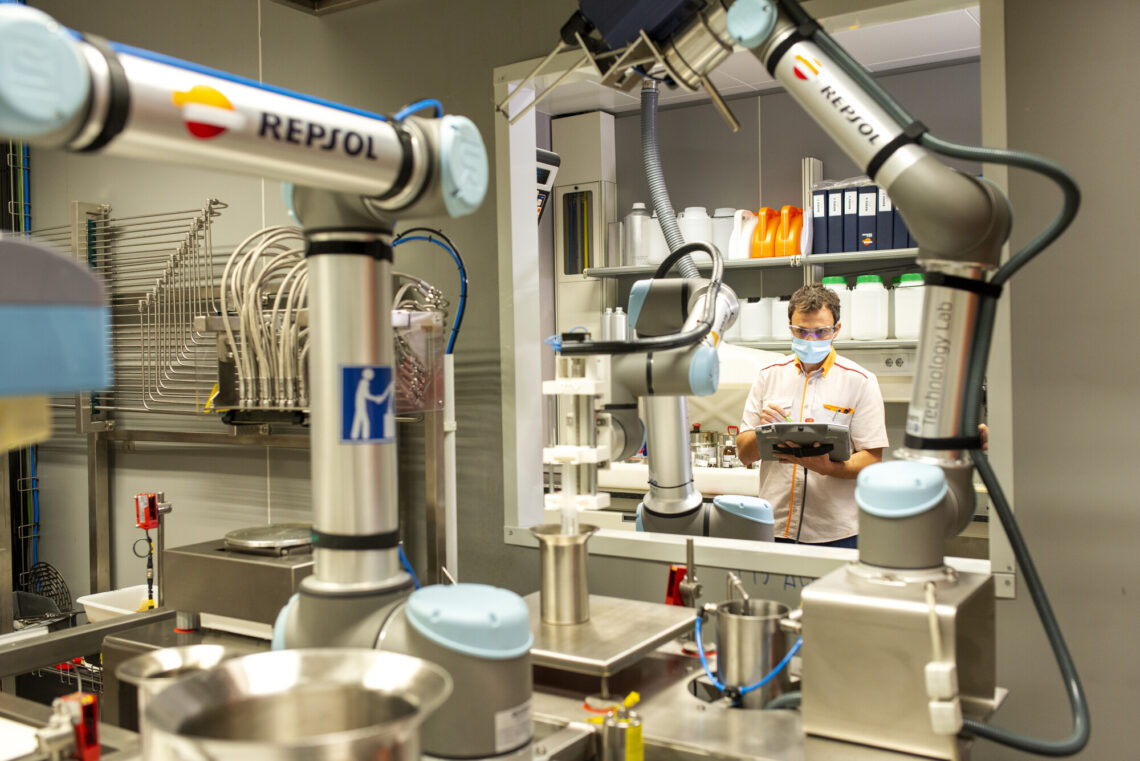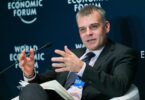Cooling Photonics, a startup created from the research of the Phononic and Photonic Nanostructures Group at Spain’s ICN2 science institute, is developing passive cooling solutions that reduce energy consumption, with zero carbon emissions, with the aim of increasing systems performance while decreasing operating costs. Its nano-fabricated coating material, applied on any surface hotter than the surrounding air, dissipates heat in the form of infrared radiation, reducing its temperature, even under direct sunlight.
Repsol, a multinational energy company based in Madrid, got an early glimpse of the technology thanks to the Mobile World Capital Barcelona Foundation, which launched The Collider, a venture building program that aims to source science at research organizations and universities and create impactful businesses out of them.
The exposure prompted Repsol’s Technology Lab, (pictured here) to form an alliance with Cooling Photonics to explore different use cases for the Spanish startup’s technology.
“We have started collaborating with Cooling Photonics in different ways,” says Silvia Pérez, a senior open innovation expert at Repsol TechLab. “It is the perfect illustration of the value we get from MWCapital. We want to have early access to technology, even before theses developments are turned into companies, to see if a particular technology can be useful for us and we can develop it together.”
Europe has always been strong in deep tech but for decades has failed to successfully commercialize its biggest scientific and technological breakthroughs. Mobile World Capital Barcelona, a member of the European Deep Tech Alliance, aims to change that dynamic by validating scientific results in the market, building balanced teams between scientists and entrepreneurs, developing business plans, incorporating young companies. and then introducing them to investors and the large corporates who can help them grow.
The involvement of large corporates is crucial to ensuring that science is successfully commercialized, says David Domingo, MWCapital’s International Ecosystem Manager. In addition to Repsol, MWCapital counts Enel, CaixaBank, Bayer, ACCIONA Energia, CEPSA, Naturgy, Telefónica, Vodafone, Orange, and Spanish brewery Damm among its corporate partners.
For companies and corporations, the creation of new business models and revenue streams based on technological innovation is critical. Deep tech innovations require a high level of specialization, engagement with researchers, and the capacity to test technologies and to successfully launch them in the marketplace. Mobile World Capital Barcelona aims to fulfill these needs.
So far, it has supported 224 scientific projects from 105 different research centers in Europe. More than 130 pilot projects have been launched with corporations and institutions, and over 65 investors have shown interest and participated in various demo days and project stages. The initiative has also involved over 90 entrepreneurs in scientific projects to help innovations make the leap from the lab.
Based on its track record with The Collider program, The European Innovation Council chose Mobile World Capital Barcelona to partner for its own tech transfer venture builder called Tech 2 Market. The foundation is also adding more public and private partners, separately incubating projects from large corporates’ R&D labs as well as EIT Manufacturing, one of the nine innovation communities belonging to the European Institute of Innovation and Technology.
Making The Leap from The Lab
“Europe is very good at science and in investing money in research, but it isn’t so good at creating money from science compared to countries like the U.S. and Israel,” says Domingo. Mobile World Capital Barcelona’s goal of helping science make the leap from the lab fits well with the foundation’s aim to make Barcelona a global tech hub, he says. With the support of the public and private sector, MWCapital focuses on four areas: the acceleration of innovation through digital entrepreneurship, the transformation of industries through digital technology, the rise of digital talent among new generations and professionals, and the reflection on the impact of technology in society. The Collider program “combines everything we have learned from supporting the startup ecosystem and applies it to cutting-edge science,” says Domingo.
MWCapital calls for the most promising research in labs, then it has an independent board of experts evaluate the technology and their opportunity in the market. If it makes the cut, the program analyzes the original team and, if needed, complements scientists with veteran entrepreneurs sourced from all over Europe to work on a business plan and pilot projects. “This is the most complex task in the program,” says Domingo. MWCapital has psychologists on its team to help ensure there is the right fit. “To make it work the scientists and the entrepreneurs have to get along well,” he says. The teams have four months to come up with a business plan. If the business plan passes the muster of a panel of experts and investors, MWCapital continue supporting the startups to survive until they can raise their first round of funding. MWCapital helps with arrangement of the tech transfer and shareholders agreement as well.
The Science of Business Building
Cooling Photonics is one of the 20 startups that have been launched by Mobile World Capital Barcelona since The Collider program started seven years ago. Allread, a company spun out of the Universitat Autònoma de Barcelona’s Computer Vision Center of Catalonia, is another.
Allread’s unique convolutional neural network technology enables the processing of images and extraction of structured alphanumeric information with an accuracy above state-of-the-art benchmarks, in highly unconstrained and complex environments. The venture builder recruited two people to develop a business around the technoology: serial entrepreneur Miguel Silva-Constenla and Adriann Landman, who has a business background. “It was a solution searching a problem,” says Landman.
Silva-Constenla and Landman teamed up with a senior Computer Vision and Machine Learning scientist and Allread was founded as a company in March 2019. The initial idea, in 2018, was to use the technology to read gas meters but the idea didn’t scale. Following a pre-seed roundin early 2019, the team tested the technology in various pilot projects in logistics and utilities where a clear pain point stood out: despite living in a digital era, text still appears in infinite ways: printed, engraved, painted, labelled on products, vehicles, containers and more, in supply chains. Companies spend a lot of time and money trying to extract this valuable information for identification, monitoring and tracking purposes, using outdated technologies and manual repetitive processes.
MWCapital provided coaching and training during the first year and was instrumental in helping with the shareholders agreement, says Landman. “It was quite tricky in the beginning with the university – it was difficult to come to an agreement. The Collider program helped a lot,” says Landman.
In mid-2020, AllRead closed a seed round led by Global Omnium’s corporate venturing fund Go-Hub Ventures, completed by business angels, family offices and public grants. From then on, the company started narrowing down its focus on the port logistics industry where artificial vision can have a massive impact on operational efficiency and sustainability.
In 2022, the team closed a €2,5 million pre-series A round, led by venture capital firm Clave Capital, Puertos del Estado public fund, CDTI and several business angels.
MWCapital put the startups in touch with corporates but working with them was not always easy. “We lost so much time with corporations that didn’t know what they were doing and didn’t know how to buy technology even if they had an innovation department and a budget,” says Landman. “Our ideal customer is a mid-sized company that is more willing to take risks, has a shorter decision cycle and is more sensitive about the value of our time.”
Concentrating on being the best in one industry eventually paid off. AllRead today counts ports and terminal operators in more than ten countries in Europe and Latin America as customers, offering a system targeted at both port landowners and port operators that captures and extracts container handling and transit information with minimal hardware requirements, Landman said.
Aiding Corporate Innovation
The Spanish venture builder’s large corporate partners like Repsol source innovation from a variety of partners, ranging from accelerators to tech hubs. The advantage in engaging with MWCapital is the deep tech innovations are early stage so they “discover technologies that might impact them in 10-15 years,” says Domingo. “For them it is sometimes difficult to evaluate the science. Our role is to validate it and be the bridge that gives them access to projects so they can be the first ones piloting the technologies.”
The venture builder is helpful to its corporate partners in other ways. “The Collider’s methodology is helpful for us in evaluating the science and business potential of our own innovations,” says Repsol’s Perez.
MWCapital additionally helps corporates validate projects that they develop internally. “They own their R&D, but we can support them validating the technology with external experts and industry contacts.” says Domingo.
Ensuring Europe’s Competitiveness
Europe has the technical talent and research leadership required to play a key role in global deep tech. It has the largest share of high-cited research publications (43%), The percentage of STEM graduates is much higher in Europe (22-35%), compared to 18% in the U.S. and Europe hosts leading science and engineering universities. It is home to six of the top 20 computer science and 5 of the top 20 engineering universities. Indeed, a Dealroom report points to a number of Europe’s unicorns (companies with valuations of $1 billion or more) that have their roots in academia. BioNtech, which became a superstar of mRNA research with its COVID vaccines,, was spun out of Johannes Gutenberg University Mainz, Celonis, a process mining company was spun-out of the Technical University of Munich, Climeworks, a company focused on C02 capture, was spun-out of ETH Zurich and cybersecurity company Darktrace has its roots in Cambridge University.
But the spin-out process from universities and research centers is still painful and scientists’ lack of sales and business experience hampers progress. Europe’s corporations on average lag behind their international peers on metrics of profitability, growth, and innovation, according to a McKinsey Global Institute report. “Europe has many high-performing companies, but in aggregate, its firms are growing more slowly, creating lower returns, and investing less in R&D than their US counterparts. This largely reflects long-standing weakness in technology and other forms of disruptive innovation, “ says the report. As technology and disruption continue to spread across sectors and exert deepening influence on competitiveness, Europe” is vulnerable almost everywhere,” says McKinsey. “Corporate value added of €2 trillion to €4 trillion a year could be at stake by 2040. To put this into perspective, that would be equivalent to about half of total forecast European GDP growth to 2040.”
If Mobile World Capital Barcelona has its way with their tech transfer program, Europe will bring more of its cutting-edge science to market and leverage those innovations to create a different future, says Domingo.
“In addition to boosting corporate innovation and Europe’s GDP there is another important reason should increase the impact of the deep technologies coming from science, as they have the potential to solve some of the global social challenges we’re facing, such as sustainability, clean energy, or health, among many others,” he says.
This article is content that would normally only be available to subscribers. Sign up for a four-week free trial to see what you have been missing.





